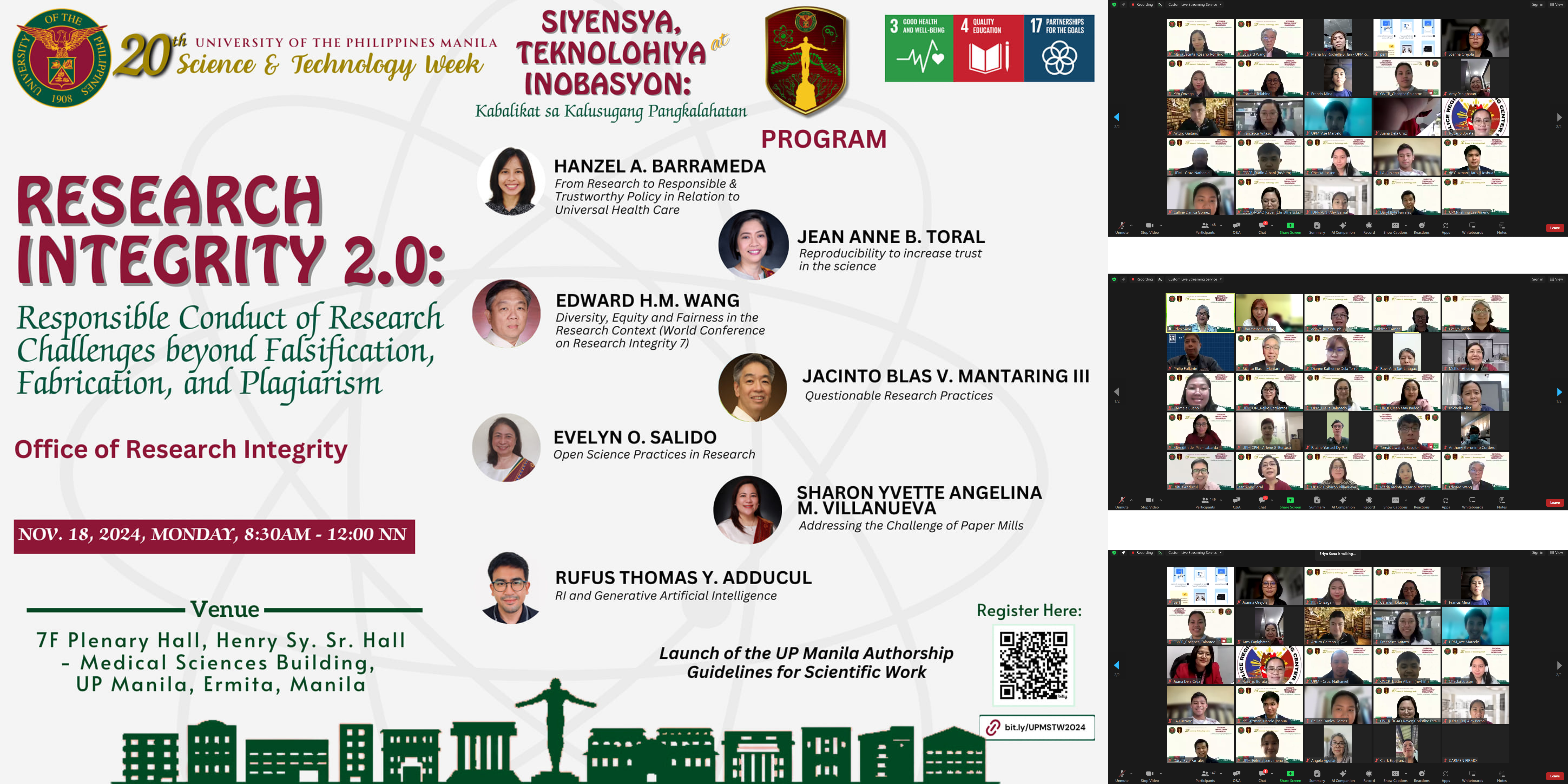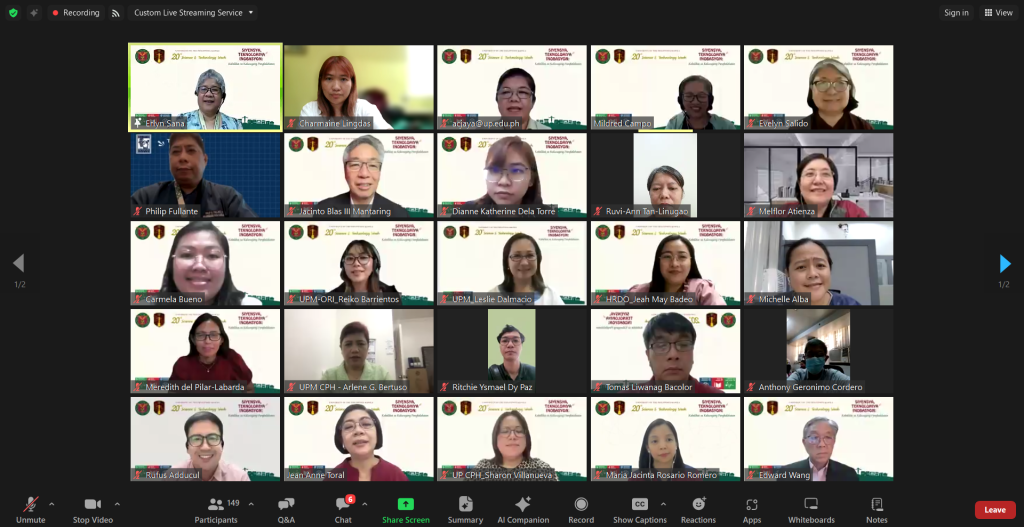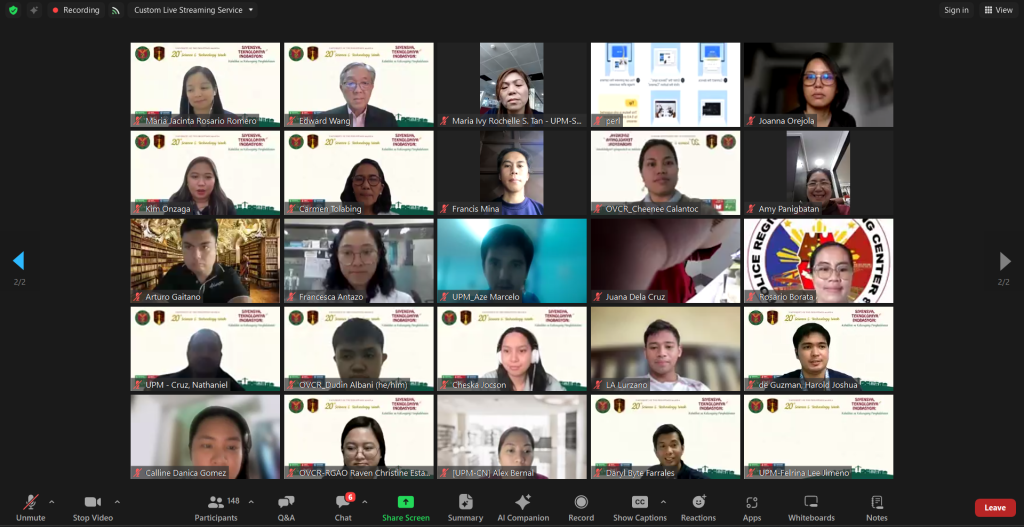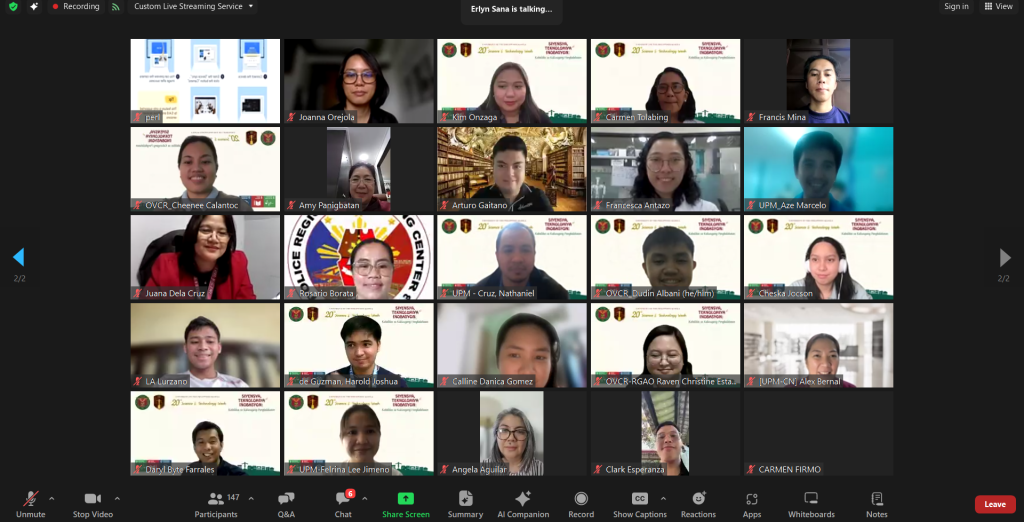
Text by: Charmaine A. Lingdas
Day 1 of the University of the Philippines Manila (UPM) Science and Technology Week 2024 centered on the theme “Research Integrity 2.0: Responsible Conduct of Research Challenges Beyond Falsification, Fabrication, and Plagiarism.” The session brought together experts to explore emerging ethical issues in scientific research and their implications. It tackled critical topics such as diversity, equity, and fairness in the research context, questionable research practices (QRPs), reproducibility, open science, the challenge of paper mills, and the growing influence of generative artificial intelligence (AI) on the research landscape.
Research-to-Policy Connections
The first presentation by Hanzel Barrameda, senior health program officer, Health Research Division, Health Policy Development and Planning Bureau of the Department of Health (DOH), centered on translating research into actionable health policies.
She outlined the DOH’s Medium-Term Health Research and Innovation Agenda (MTHRIA) and stated, “This agenda prioritizes research with the greatest health impact, focusing on areas with the potential to significantly improve public health outcomes.” The MTHRIA is a strategic roadmap for DOH to address practical knowledge gaps and guide policy.
She highlighted the importance of engaging policymakers early in the research process to ensure findings are relevant and impactful. “Our objective is to ensure that research is not conducted merely for the sake of research but is actively used to inform and shape policies and practices that address the evolving needs of our population,” she emphasized.
Fostering Equity in Global Research
Dr. Edward Wang, program leader of the UP College of Medicine Surgical Innovation and Biotechnology Laboratory (SIBOL) and former director of the Office of Research Integrity (ORI), discussed the Cape Town Statement on Research Integrity, which advocates for fair practices in research collaborations between high-income and low- and middle-income countries (HICs and LMICs).
“Helicopter research is when HIC researchers arrive, conduct their work, and then leave, without considering the local context or involving local researchers,” he stated. He stressed the importance of inclusivity, indigenous knowledge recognition, and capacity-building to create equitable global collaborations.
He emphasized, “The Cape Town Statement is not just a document; it’s a call to action. It’s about creating fair and lasting partnerships that respect the knowledge, the autonomy, and the capacity of all partners involved. Research integrity is about ensuring that everyone, regardless of their location or resources, has an equal opportunity to contribute and benefit.”
Open Science: Breaking Barriers to Knowledge
Dr. Evelyn Salido, professor, UP College of Medicine, highlighted open science as a transformative movement promoting transparency and collaboration. “Open science increases scientific collaborations and sharing of information for the benefit of science and society,” she said. She noted that the process goes beyond sharing publications; it includes research data, open educational resources, and even open-source software and hardware, all of which contribute to a more inclusive and transparent scientific community.
She further emphasized the importance of citizen science, where the public is actively involved in data collection and the ideation process. “Citizen science involves open proposals, community engagement, and the use of open data and methods, making the research process more inclusive and transparent.”
Reproducibility as a Cornerstone of Trust
Dr. Jean Anne Toral, director of the Office of Research Integrity (ORI), spoke on the importance of reproducibility in scientific research. Dr. Toral explained reproducibility as “obtaining consistent results using the same input data, methods, and conditions as the original study.” She contrasted this with replicability, which involves obtaining similar results with new data and procedures.
She emphasized the importance of transparency throughout the research process stating, “From formulating hypotheses to reporting findings, researchers must fully disclose methods, data, and protocols to ensure studies are reproducible.”
She underscored the critical need for a cultural shift in research, making reproducibility a standard practice across disciplines that ensures the reliability and trustworthiness of scientific discoveries. With its focus on ethical and transparent research, UP Manila continues to lead efforts in advancing the integrity and impact of science.
Tackling Questionable Research Practices (QRPs)
Dr. Jacinto Mantaring III, chair of the UP Manila Research Ethics Board, addressed questionable research practices (QRPs), describing them as a “gray area” that undermines the credibility of scientific research. He emphasized the systemic pressures that contribute to QRPs, such as the “publish or perish” culture. “QRPs erode trust in science and compromise public confidence,” He warned, advocating for pre-registration and transparency to mitigate their prevalence.
He outlined steps to combat QRPs, including the importance of pre-registering research protocols and data sharing. “Transparency is key,” he said, emphasizing that researchers must be open about their methods and results, regardless of whether they confirm their hypotheses. He also advocated for the use of open science principles, which promote rigorous methodologies and accountability.
The Growing Threat of Paper Mills
Dr. Sharon Yvette Angelina M. Villanueva, professor and assistant to the Dean for Research, focused on paper mills, organizations that produce fraudulent research papers for a fee. She highlighted their damaging effects on scientific integrity and public trust and explained that paper mills exploit the pressure to publish, creating a cycle of unethical practices.
“It’s critical that institutions have protocols in place to stop paper mills from gaining access to their systems,” she said. She emphasized the effort to eradicate paper mills is not just a concern for individual researchers but for the entire scientific community. She concluded, “Researchers, institutions, publishers, and even funders must work together to protect the integrity of scientific research and prevent the proliferation of fraudulent papers.”
Generative AI in Research: Opportunities and Risks
Rufus Thomas Y. Adducul, project development officer at the Institute of Human Genetics, UP Manila National Institutes of Health, concluded the presentations by discussing the impact of generative AI in scientific research. He highlighted its potential to streamline workflows while cautioning against risks like hallucinations and misuse in proposal writing.
“Generative AI must be used responsibly to enhance efficiency without compromising integrity,” he stressed as he also emphasized the need for AI advancements that ensure ethical and transparent practices.
Despite these challenges, he believes that AI can play a crucial role in combating fraud in research. “AI, particularly traditional AI tools, is already being used to detect image duplication and measure textual similarities, which is valuable in preventing unethical practices,” he noted. “AI can also level the playing field for non-native English speakers by assisting in writing support and enhancing fluency.”
A Call for Ethical Collaboration
Dr. Maria Jacinta Rosario H. Romero, coordinator of the College of Dentistry, Office of Research Integrity, wrapped up the session with a call for collective responsibility in fostering research integrity. “By upholding ethical practices, we ensure that science remains a force for positive change.”
Day 1 of UPM Science and Technology Week 2024 emphasized the critical role of responsible conduct in advancing Universal Health Care and demonstrated UPM’s commitment to leading the way in ethical and impactful scientific research.


